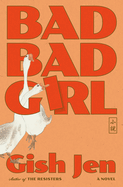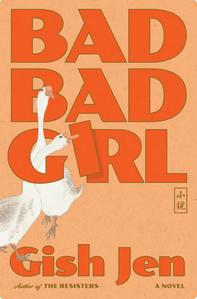
 Gish Jen's autobiographical Bad Bad Girl is a singular intergenerational novel. Jen's act of imaginative empathetic storytelling is inspired by the author's complex, frequently antagonistic, relationship with her mother, who immigrated from China in the 1940s. Jen (The Resisters; Thank You Mr. Nixon) re-creates her mother's childhood as a privileged girl in pre-Revolutionary China, her solitary journey to pursue her graduate studies in the United States, and her subsequent life there. It's a story both deeply personal and universally resonant.
Gish Jen's autobiographical Bad Bad Girl is a singular intergenerational novel. Jen's act of imaginative empathetic storytelling is inspired by the author's complex, frequently antagonistic, relationship with her mother, who immigrated from China in the 1940s. Jen (The Resisters; Thank You Mr. Nixon) re-creates her mother's childhood as a privileged girl in pre-Revolutionary China, her solitary journey to pursue her graduate studies in the United States, and her subsequent life there. It's a story both deeply personal and universally resonant.
Jen skillfully navigates the cultural misalignments, the sacrifices, and fierce determination that characterized her mother's life, and later her father's, as an immigrant. Jen's artistic reach allows her to reconstruct events and the emotional landscape of her mother's inner world, giving readers a detailed sense of the woman behind her memories. This extraordinary portrayal includes poignant imagined posthumous conversations with her mother. "I'm glad that I'm not as angry with you as you were at your mother," Jen says, to which her mother responds, "You were angry enough to write this book." Through these exchanges, Jen grapples with the reasons for her mother's abuse and favoritism, seeking clarification and offering parallels between their lives. "She did not want me asking why I couldn't wear pants or miniskirts or use tampons, either.... Everything was no." The title itself, Bad Bad Girl, is the phrase Jen's mother often used in reference to her daughter.
The conversations feel strikingly authentic, capturing the rhythm and tone of mother-daughter dynamics. This technique allows Jen to explore movingly themes of memory, legacy, and the ongoing influence of the deceased on the living, transforming what could have been a straightforward reconstruction of events into a vibrant, ongoing dialogue across time and mortality.
Jen's prose is precise, elegant, and often witty in a way that acts as a balm for some of the more troubling events, like when the teenage daughter runs away and is severely beaten by her father, under the mother's approving eye. Jen has a remarkable ability to distill complex emotions and experiences into clear, evocative language.
The historical context of Jen's family's journey is seamlessly integrated, providing a dynamic backdrop without ever overwhelming the personal narrative. Bad Bad Girl is a powerful reminder that while death may silence voices, it cannot extinguish the conversations that continue in our hearts and minds. This book is imperative for anyone interested in immigrant experiences, the complexities of family, and the art of writing personal history. --Elizabeth DeNoma, executive editor, DeNoma Literary Services, Seattle, Wash.
Shelf Talker: Gish Jen's autobiographical novel is a brilliant and touching emotional depiction of a conflicted mother-daughter relationship.

